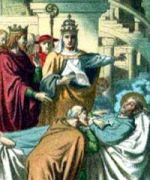Make your gift today!
Help keep Catholics around the world educated and informed.
Already donated? Log in to stop seeing these donation pop-ups.
Catholic World News News Feature
Voices from the Synod of Bishops October 07, 2008
The following are excerpts from talks delivered during the early sessions of the Synod of Bishops, which is meeting at the Vatican to discuss the theme: "The Word of God in the Life and Mission of the Church."
Archbishop John Olordunfemi Onaiyekan of Abuja, Nigeria:
The cost of a Bible may be minimal in many parts of the world. In Africa, it can be as high as a month's wages in many places. The result is that many people do not have enough money to own a Bible.Archbishop Toma Menamparampil of Guwahati, India:
When a civilization is closely related to a major religion (e.g., Islamic, Hindu, Confucian, Shinto), the borrowing of elements suited for faith and worship from those religions will need to be handled with care. If the teacher of the 'Word' begins to use expressions that adherents to these great religions consider as their own, they may take it as violation of what is sacred to them, and the Christian community as an imposition of something alien.Cardinal Josip Bozanic of Zagreb, Croatia:
There is an indissoluble bond between the Bible and Europe. All that has made European culture and civilisation great ... found its origins in the Bible… Europe without God risks becoming a nest of anguish and builds a civilisation of fear. The Word of God restores hope and joy.Bishop Michael Ernest Putney of Townsville, Australia:
After World Youth Day, some Australians and New Zealanders have a sense that the promise of a new evangelization may finally be underway despite the apparent impermeability of the secular culture.Chief Rabbi Shear-Yashuv Cohen of Haifa, Israel:
I deeply feel that my standing here before you is very meaningful. It brings with it a signal of hope and a message of love, co-existence and peace for our generation, and for generations to come.Cardinal Albert Vanhoye, SJ, former rector of the Pontifical Biblical Institute:
We pray to God using His own words, as related to us in the Scriptures. Likewise we praise Him, also using His own words from the Bible. We ask for His mercy, mentioning what He has promised to our ancestors and to us. Our entire service is based upon an ancient rule, as related to us by our Rabbis and teachers: "Give Him of what is His, because you and yours are His...."
It is amazing to observe how the Holy Scriptures never lose their vitality and relevance to present issues of our time and age, This is the miracle of the everlasting and perpetual 'Word of God.'
The Jewish people's Scriptures are received in the Christian Bible under the name Old Testament. [A document on the subject by the Pontifical Biblical Commission] immediately points out that 'By 'Old Testament' the Christian Church has no wish to suggest that the Jewish Scriptures are outdated or surpassed. On the contrary, it has always affirmed that the Old Testament and the New Testament are inseparable.Cardinal Franc Rode, prefect of the Congregation for Religions:
Therefore, the New Testament is situated in a line of deep faithfulness in relationship to the Sacred Scriptures of the Jewish people, however a faithfulness that is at the same time creative, conforming to the prophetic oracles that announced 'the new covenant…'
However, the document states: 'In the New Testament, the reproaches addressed to Jews are not as frequent or as virulent as the accusations against Jews in the Law and the Prophets. Therefore, they no longer serve as a basis for anti-Jewish sentiment. To use them for this purpose is contrary to the whole tenor of the New Testament…
In concluding, the document states that the New Testament is 'in serious disagreement with the vast majority of the Jewish people,' because "it is essentially a proclamation of the fulfilment of God's plan in Jesus Christ (announced in the Old Testament)," and the vast majority of the Jewish people "does not accept this fulfilment."
The renewal to which consecrated people are constantly called is most appropriately enacted by returning to the evangelical roots of a charism, there to find new inspiration. If each charism constitutes an 'evangelical word' of the One Word, a specific aspect of the totality of the Gospel, then by living the Gospel to the full consecrated people will find a light with which to understand the particular evangelical dimension upon which their own institute is founded.Cardinal Francis Eugene George of Chicago:
Too often, the contemporary imagination has lost the image of God as actor in history. The contemporary intellect finds little consistency in the books of the Bible and is not informed by the regula fidei. The contemporary heart has not been shaped by worship and the submission to God's word in the liturgical year.






